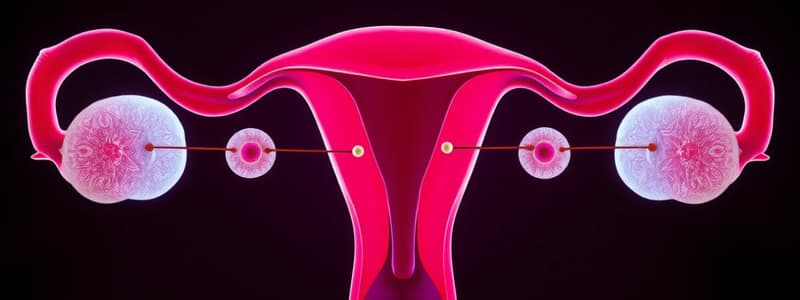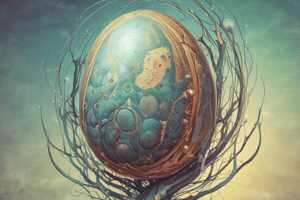Podcast
Questions and Answers
What happens to the corpus luteum if fertilization does not occur?
What happens to the corpus luteum if fertilization does not occur?
- It continues to produce hormones.
- It forms a fibrotic scar tissue called the corpus albicans. (correct)
- It enlarges to support the embryo.
- It is maintained by human chorionic gonadotropin.
Which hormone prevents the degeneration of the corpus luteum following fertilization?
Which hormone prevents the degeneration of the corpus luteum following fertilization?
- Estrogen
- Human chorionic gonadotropin (correct)
- Luteinizing hormone
- Progesterone
What is the result of the cortical and zona reaction that occurs when the oocyte is fertilized?
What is the result of the cortical and zona reaction that occurs when the oocyte is fertilized?
- Prevention of polyspermy (correct)
- Development of the corpus albicans
- Activation of endogenous transcription factors
- Formation of the male pronucleus
What marks the swelling of the sperm nucleus during fertilization?
What marks the swelling of the sperm nucleus during fertilization?
What triggers the resumption of the second meiotic division in an egg?
What triggers the resumption of the second meiotic division in an egg?
What is the primary location where fertilization occurs?
What is the primary location where fertilization occurs?
What occurs as a result of fertilization concerning the chromosome number?
What occurs as a result of fertilization concerning the chromosome number?
Which process initiates after fertilization and involves division of the zygote?
Which process initiates after fertilization and involves division of the zygote?
Which stage of cell division is reached approximately 30 hours after fertilization?
Which stage of cell division is reached approximately 30 hours after fertilization?
What happens to the cells after the third cleavage division during embryonic development?
What happens to the cells after the third cleavage division during embryonic development?
What significant structure develops as a result of blastocyst implantation?
What significant structure develops as a result of blastocyst implantation?
At what point is the four-cell stage of development typically achieved?
At what point is the four-cell stage of development typically achieved?
What function do tight junctions serve during the compaction of cells after cleavage?
What function do tight junctions serve during the compaction of cells after cleavage?
What is the duration taken for the blastocyst to completely wedge itself into the endometrial lining after fertilization?
What is the duration taken for the blastocyst to completely wedge itself into the endometrial lining after fertilization?
When does implantation typically occur during the process of early pregnancy?
When does implantation typically occur during the process of early pregnancy?
What key development begins immediately after the blastocyst has implanted into the uterine lining?
What key development begins immediately after the blastocyst has implanted into the uterine lining?
What is the name given to the structure that implants into the uterine lining?
What is the name given to the structure that implants into the uterine lining?
In what stage of pregnancy does implantation occur?
In what stage of pregnancy does implantation occur?
What occurs immediately after the blastocyst attaches to the uterine lining?
What occurs immediately after the blastocyst attaches to the uterine lining?
Which of the following statements about implantation is NOT true?
Which of the following statements about implantation is NOT true?
How does the blastocyst prepare for implantation?
How does the blastocyst prepare for implantation?
What is the function of the cumulus oophorus cells during ovulation?
What is the function of the cumulus oophorus cells during ovulation?
What occurs to the granulosa cells after ovulation?
What occurs to the granulosa cells after ovulation?
Which event must happen to spermatozoa before they can fertilize an oocyte?
Which event must happen to spermatozoa before they can fertilize an oocyte?
What triggers the muscular contractions in the ovarian wall during ovulation?
What triggers the muscular contractions in the ovarian wall during ovulation?
What is formed when granulosa cells are transformed under the influence of luteinizing hormone?
What is formed when granulosa cells are transformed under the influence of luteinizing hormone?
What is the role of the zona pellucida during fertilization?
What is the role of the zona pellucida during fertilization?
Which of the following correctly describes the follicle's environment after ovulation?
Which of the following correctly describes the follicle's environment after ovulation?
What describes the process that spermatozoa undergo to prepare for fertilization?
What describes the process that spermatozoa undergo to prepare for fertilization?
What happens to the vesicular (Graafian) stage as it enters Meiosis II?
What happens to the vesicular (Graafian) stage as it enters Meiosis II?
What structure forms a fibrotic scar tissue if fertilization does not occur?
What structure forms a fibrotic scar tissue if fertilization does not occur?
What is a result of the degeneration of Lutein Cells?
What is a result of the degeneration of Lutein Cells?
What is the first step in the sequence of phases of fertilization?
What is the first step in the sequence of phases of fertilization?
Which of the following phases occurs immediately after the penetration of Zona Pellucida?
Which of the following phases occurs immediately after the penetration of Zona Pellucida?
What is the role of the Zona Pellucida during fertilization?
What is the role of the Zona Pellucida during fertilization?
Which event occurs approximately 2 hours after ovulation?
Which event occurs approximately 2 hours after ovulation?
What is the primary function of the Corpus Luteum?
What is the primary function of the Corpus Luteum?
Flashcards are hidden until you start studying
Study Notes
Ovarian Cycle and Follicle Development
- Remaining cavity of the follicle post-ovulation fills with fibrin.
- High LH concentration increases prostaglandin levels, causing muscular contractions in the ovarian wall, aiding in oocyte expulsion with surrounding granulosa cells.
- Granulosa cells from the ruptured follicle become lutein cells under LH influence, forming the corpus luteum.
Capacitation and Fertilization
- Spermatozoa cannot fertilize the oocyte immediately; they undergo Capacitation and Acrosome Reaction after reaching the uterine tube.
- Capacitation involves the removal of glycoprotein coat and seminal plasma membrane surrounding the sperm's acrosomal region.
- The presence of human chorionic gonadotropin (hcG) prevents corpus luteum degeneration if fertilization occurs.
Fertilization Process
- Fertilization occurs in the ampullary region of the fallopian tube.
- Sperm movement aided by uterine muscular contractions, not just sperm propulsion.
- Fertilization restores the diploid chromosome number, determines sex, and initiates cleavage.
Early Embryonic Development
- A two-celled zygote is formed about 30 hours after fertilization and undergoes cleavage divisions, developing into blastomeres.
- Can reach the four-cell stage around 40 hours post-fertilization.
- After three cleavage divisions, cells compact, segregating into an inner cell mass and outer cell mass, forming a 16-cell morula by day three.
Implantation
- The blastocyst forms after several divisions and is ready for implantation approximately seven days post-fertilization.
- Implantation involves the blastocyst embedding into the uterine lining, taking about five days to complete.
- Following implantation, cell division begins to specialize forming the embryo's body and placenta.
Following Ovulation
- Most cases of implantation occur around 9 days after ovulation, marking an early stage of pregnancy.
- Alongside the hormonal changes, this process is integral to successful implantation and embryo development.
Key Terms
- Corpus Luteum: Temporary endocrine structure formed from ruptured follicles.
- Corpus Albicans: Fibrotic scar tissue formed if fertilization does not occur.
- Capacitation: Process enabling sperm to penetrate the oocyte.
- Acrosome Reaction: Release of enzymes allowing sperm to penetrate the zona pellucida.
Studying That Suits You
Use AI to generate personalized quizzes and flashcards to suit your learning preferences.




